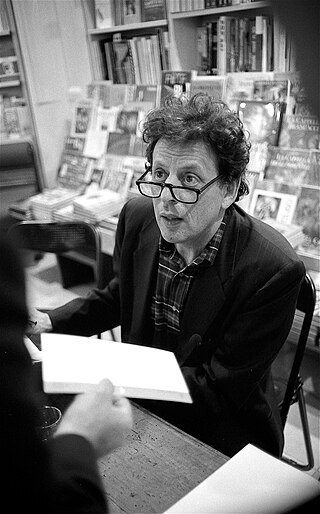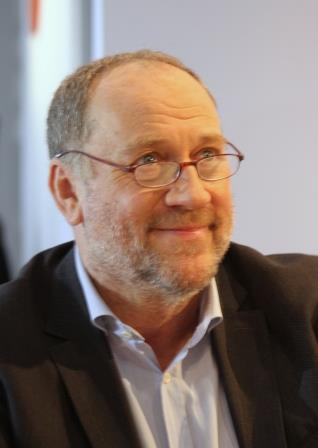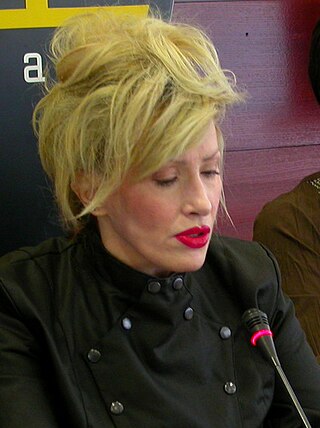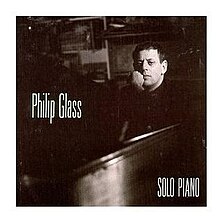
Philip Glass is an American composer and pianist. He is widely regarded as one of the most influential composers of the late 20th century. Glass's work has been associated with minimalism, being built up from repetitive phrases and shifting layers. Glass describes himself as a composer of "music with repetitive structures", which he has helped to evolve stylistically.

"Howl", also known as "Howl for Carl Solomon", is a poem written by Allen Ginsberg in 1954–1955 and published in his 1956 collection Howl and Other Poems. The poem is dedicated to Carl Solomon.

Anthony George Banks is an English musician, songwriter, singer and film composer primarily known as the keyboardist and founding member of the rock band Genesis. Banks is also a prolific solo artist, releasing six solo studio albums that range through progressive rock, pop, and classical music.

Hydrogen Jukebox is a 1990 chamber opera featuring the music of Philip Glass and the work of beat poet Allen Ginsberg. Its name is taken from a phrase coined by Ginsberg, from his 1955 poem Howl.

Hans Hugo Harold Faltermeyer is a German musician, composer and record producer.
"Cavatina" is a 1970 classical guitar piece by British composer Stanley Myers based on music originally written for the soundtrack of the film The Walking Stick (1970). After Myers expanded the piece and it was recorded by guitarist John Williams, "Cavatina" was popularized as the theme from the 1978 film The Deer Hunter.
Richard "Ribbs" Gibbs is an American film composer and music producer whose credits include Dr. Dolittle, Big Momma's House, Queen of the Damned, the television series Battlestar Galactica and the first season of The Simpsons.

Charles Plymell is a poet, novelist, and small press publisher. Plymell has been published widely, collaborated with, and published many poets, writers, and artists, including principals of the Beat Generation.

"Valley of Darkness" is the second episode of the second season of the reimagined Battlestar Galactica television series. It aired originally on the Sci Fi Channel on July 22, 2005.
Metamorphosis is a biological process by which an animal physically develops after birth.
Jerome Kitzke is a composer who grew up along the southwestern shore of Lake Michigan in South Milwaukee, Wisconsin.

The Fall of America: Poems of These States, 1965–1971 is a collection of poetry by Allen Ginsberg, published by City Lights Bookstore in 1973, for which Ginsberg shared the annual U.S. National Book Award for Poetry. It is characterized by a prophetic tone inspired by William Blake and Walt Whitman, as well as an objective view characterized by William Carlos Williams. The content is more overtly political than most of his previous poetry with many of the poems about Ginsberg's condemnation of America's actions in Vietnam. Current events such as the Moon Landing and the 1968 Democratic National Convention, the death of Che Guevara, and personal events such as the death of Ginsberg's friend and former lover Neal Cassady are also topics. Many of the poems were initially composed on an Uher Tape recorder, purchased by Ginsberg with the help of Bob Dylan.
The music of the 2004 TV series Battlestar Galactica is a body of work largely credited to the composers Bear McCreary and Richard Gibbs. The music of Battlestar Galactica displays a variety of ethnic influences and generally does not conform to the "orchestral" style of many science fiction scores.

The Hours is the original soundtrack album, on the Elektra/Nonesuch label, of the 2002 film The Hours, starring Nicole Kidman, Meryl Streep and Julianne Moore. The original score was composed by Philip Glass.
"Three-Five-Zero-Zero" is an anti-war song, from the 1967 musical Hair, consisting of a montage of words and phrases similar to those of the 1966 Allen Ginsberg poem "Wichita Vortex Sutra". In the song, the phrases are combined to create images of the violence of military combat and suffering of the Vietnam War. In its first line, for instance, "Ripped open by metal explosion" is followed by "Caught in barbed wire/Fireball/Bullet shock".

Aleksandra Milošević Hagadone, better known as Slađana Milošević, was a Serbian singer, songwriter, record producer, and writer.
"Wichita Vortex Sutra" is an anti-war poem by Allen Ginsberg, written in 1966. It appears in his collection Planet News and has also been published in Collected Poems 1947-1995 and Collected Poems 1947-1980. The poem presents Ginsberg as speaker, focusing on his condemnation of the Vietnam War. It features imagery of the war and America's Heartland interspersed with news reports and cultural references. It is also written in Ginsberg's distinctive Whitman-like long-prose style.
Águas da Amazônia, Sete ou oito peças para um balé is a 1993–99 musical composition by the American contemporary classical composer Philip Glass. Its first recording was performed by the Brazilian instrumental group Uakti.
Sally Whitwell is an Australian classical music pianist, composer, arranger, conductor and teacher. She has released five solo albums all on the ABC Classics record label. The first three albums peaked in the top 5 on the ARIA Charts' Classical Albums.









